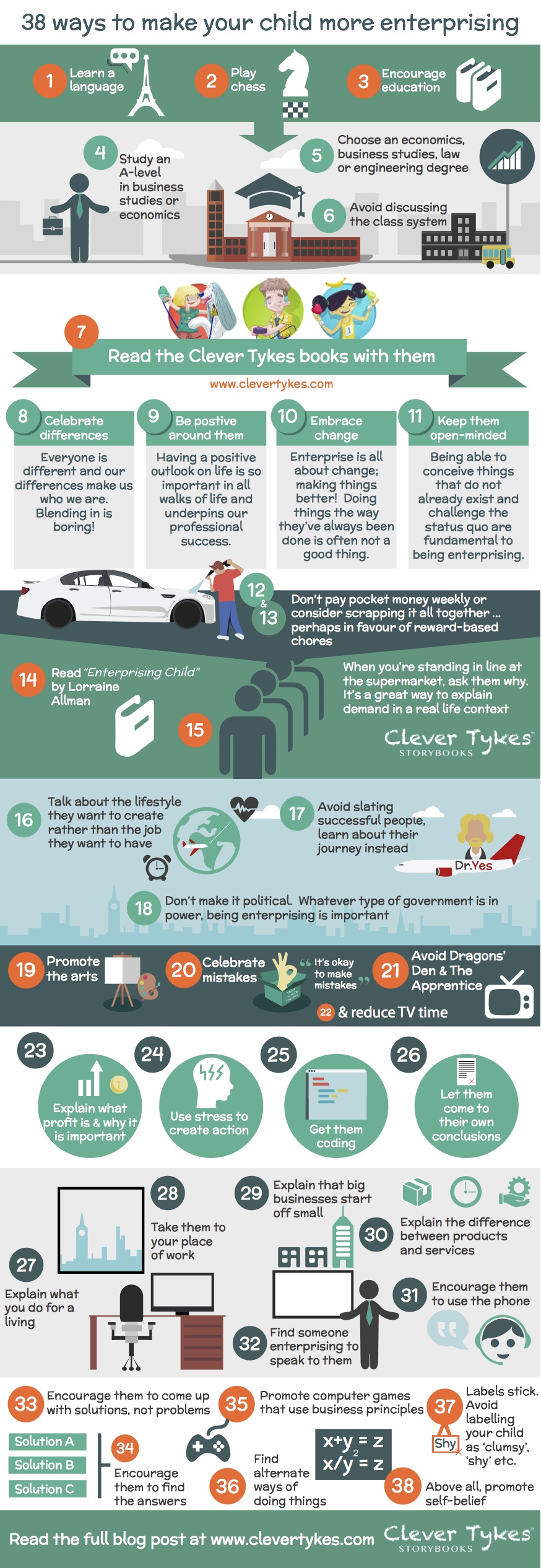
13 May 38 ways to help your child be more enterprising
We all want the best for our children and the next generation. Certain traits and characteristics are universally recognised as being important for children to grow up into resourceful, innovative and, ultimately, successful adults. Collectively, these traits are what I would describe as being enterprising and there is an increased awareness of enterprise amongst parents and schools as we move further into the 21st century.
How to encourage your child be more enterprising:
1. Celebrate mistakes
Mistakes are a great way to learn important lessons and they really help children develop enterprising mindsets. Making mistakes means we’re trying new things and not afraid of getting things wrong. The more mistakes we make, the more we learn about ourselves and how best to do things. Read more about the importance of mistakes here.
2. Talk about ‘lifestyles’ rather than ‘jobs’
Many jobs have defined parameters in terms of what they entail, what’s expected of workers in these careers, their status in society and what they earn. There are also preconceptions around what kind of people do these jobs and the kind of qualifications one needs to get that job. This can create a defined and one-dimensional view of growing up and aspiration. Instead, discuss what lifestyle someone would enjoy. Virtually every lifestyle can be achieved through being enterprising about your career so avoid pigeon-holing a lifestyle for the sake of a job.
3. Do an economics or business studies A-level
Enterprise education is proven to increase the likelihood of someone starting their own business and that business succeeding. But more than this, knowledge of how the world and, particularly, money works, helps you understand why things are the way they are and how to change or capitalise on them.
4. Do an economic, business studies, law or engineering degree
Currently, these degrees are the ones that produce the most entrepreneurs (if someone actually goes to university!). Contrary to popular belief, the majority of the millionaires in the UK did actually go to university.
Psst! Check out the Clever Tykes storybooks on Amazon
5. Avoid slating successful people
It’s really damaging for us to criticise people who are successful or maybe famous people who have tried something new and failed. If children think that being successful and making mistakes are not good things, they’ll shy away from being enterprising, trying new things and pushing the boundaries of their abilities.
6. Don’t make it political
Politics in the UK and around the world is incredibly complex. The fact is that whatever type of government is in power, being enterprising is always going to be important. Lining up excuses or reasons for why someone can’t be successful because of certain policies will create unnecessary negativity about something we can do very little about.
7. Avoid Dragons’ Den and the Apprentice
On the whole, these shows do not help children become more enterprising. Portraying business people in the light that these shows do, is detrimental to entrepreneurship and they create questionable and often incorrect beliefs about business and business people. Read more about this here.
8. Get them using the phone!
With so much modern technology and alternative ways of communication, the next generation spend less and less time on the phone. The problem is that speaking on the phone is an incredibly important skill and it’s fantastic to be confident using the phone. Making an impression on people is far easier when speaking than in text or email. Get them calling family and friends as much as possible.
9. Read Enterprising Child
Enterprising Child by Lorraine Allman is a great book for parents with children aged 4 – 14 and contains loads of great ways to encourage enterprising behaviour in children.
10. Promote economics-based computer gameplay
Even my days of playing Football Manager have helped me understand finance. Games like Roller-coaster Tycoon provided great insights into supply and demand issues as well as customer service and hitting targets. War and civilisation games that required the player to create a thriving economy and society by mining natural resources and trading them were incredibly useful to me.
11. Read the Clever Tykes books with them
Well, we had to say it! The Clever Tykes books promote positive entrepreneurial role models and contain many important lessons for children ages 6-9 that will certainly make them more enterprising! Check out our store page.
12. Encourage education
Formal education is important and must still be encouraged. We’re always learning new things and the skills we gain at school are vital. It is simply not true that the best businesspeople fall out of school; some do, but increasingly, entrepreneurs have attended university and gained knowledge in specific areas.
13. Find alternative ways of doing things
In school, children are not only given tasks but the method for completing that task (especially in science and maths, for example). The truth is that in real life, we know where we are and where we want to go, but we have no idea how to get there. Finding lots of different ways of doing things and overcoming obstacles is a truly enterprising trait.
14. Celebrate differences
It’s human nature to try and blend in with the crowd. The truth is this is not very enterprising. It often stems, again, from people not wanting to make mistakes in the spotlight. Having the confidence to do things differently and the way you want to do them is a fantastic trait.
15. Be positive around them
Positivity is infectious. It is widely known that we become more and more like the people around us. Having a positive outlook on life is so important in all walks of life and underpins our professional success.
16. Avoid discussing the class system
The class system is an archaic way of looking at society. As human beings, we love being able to put labels on things and even ourselves. The problem is that for social mobility to occur, people have to believe it can occur. It’s also important that children do not prejudge people they meet based on their perceived social status.
17. Learn a language
Languages are increasingly important in business and even knowing just one other language well, opens up opportunities in work and business. The skills learned in not only learning another language but trying to speak it with others provide great communication experience.
18. Learn to play chess
Chess is quite simply a wonderful game and has countless benefits for the developing mind. Not only must players have an excellent memory, logical thinking and powerful thought processes, but players must also be incredibly creative and imaginative to overcome problems and achieve desired outcomes.
19. Promote the arts
Pablo Picasso once said, “Every child is an artist, the problem is how to remain an artist once we grow up”. Being creative is incredibly important when it comes to being enterprising. Remember that making change requires thinking of things that are new and different – this requires creativity, just like English, art & design as well as music and drama.
20. Don’t pay pocket money weekly
Paying children a set amount every single week conditions them into expecting a flat income. If you want to inspire enterprising behaviour in your child, stop doing this now! Very few entrepreneurs have a steady income and earning money should be seen as just that – earning it rather than just a guaranteed income.
Call me crazy but:
21. Consider scrapping pocket money all together
Move to a chores or even enterprise-based system that rewards hard work and innovation – then you’re on the right track! There are other ways to develop money skills in children than by paying them pocket money.
22. Let them get things wrong
We know a guy who let his little boy list some products on Amazon. He priced them up at around 10 times the price of other similar products. What Daddy did right was let him do this. What happened? Of course, nothing sold! But this helped him learn a valuable lesson about supply, demand, price points and competition in the market.
23. Ask them why they’re stood in a queue for a shop or till
This is a great way to explain supply and demand in a real-life context. Why are so many people wanting to buy things? Where do they get their money from? How else could they spend their money? Could you create something they may want to spend their money on?
24. Explain the difference between products and services
Many children understand the principle of buying and selling products but less so about time, expertise and services.
25. Embrace change
Enterprise is all about change; making things better! Most of us like thing things we know and are familiar with but this doesn’t mean it’s right! Doing things the way they’ve always been done is often not a good thing. Seeing change as a positive is paramount to being enterprising and making those changes happen.
This one can be a major problem:
26. Don’t be too exam focussed
Education is important, but grades are not the be-all and end-all. So much pressure to perform to someone else’s standards can be very counterproductive if children begin to fear them and see them as the most important thing in their lives. Did you know only 25% of our professional success is down to our IQ and qualifications? Most of it is about our personalities and skill set.
27. Take them to your place of work
Real-life context is great for children. Seeing a work environment and business first-hand provides great insight and should inspire them to think about their career, the lifestyle they’d like and maybe a business of their own they’d like to start!
28. Explain what you or the company or organisation you work in does
How does the business make money? Is it supported by the government? What is the business model? Once more, real-life context is really important in helping children understand the world and the opportunities which lie within.
29. Explain what profit is and why it is important
Somehow, ‘profit’ has become a word that people are afraid of. The truth is that profit makes the world go round. Without it, there would be no jobs or growth in our economy. Grasping an early understanding of profit is fundamental in being able to think about opportunities that can be monetised.
Okay, I know this one’s contentious:
30. Reduce screen time (especially when they’re very young)
But the truth is, the children I know who have been glued to a screen since they were just two or three years old, seriously lack people and communication skills. There are lots of studies now showing that certain skills, especially those associated with being enterprising, are impaired by not having real-life interaction with the world.
31. Keep them open-minded
Being able to conceive things that do not already exist and challenge the status quo are fundamental to being enterprising. Telling children things are the way they are ‘just because’ and that they’ll stay that way is a sure-fire way to kill entrepreneurial spirit.
We could all do better at this one:
32. Treat stress as a good thing
Stress is a very important natural response to certain stimuli. What is important is how we use stress and the associated hormone, cortisol, to our advantage. See stressful situations as surmountable challenges and use our natural response to elicit positive actions to overcome those challenges. Seeing stress as a challenge as opposed to a threat is one of the key traits in successful people.
33. Get them coding!
Two main reasons for this: a) coding requires a range of important transferable skills b) coding is in high demand meaning it’s useful for starting a new venture or landing a great job! Coding and enterprise go hand in hand in the 21st century. (Code-it Cody certainly knows how important it is!)
34. Don’t label children as anything
It’s really easy to call someone ‘clumsy’ or ‘shy’ but really these are just arbitrary labels that will make children act in this way, even subconsciously. Us Brits are a deprecating bunch but when we say these things to a child, no matter how light-heartedly, they make an impact over time.
35. Encourage them to find the answers
Spoon-feeding is rife in our culture and expecting to be given the answer to problems immediately doesn’t make children resourceful. Thinking for oneself to find solutions is a habit and is paramount to being enterprising.
36. Explain that big businesses started off small
It’s really easy to assume massive brands have always been just that. We’re surrounded by brands like Tesco, Lloyds Bank, Adidas, Shell, Subway etc. and it’s hard to imagine a world without them. Our children take all these companies for granted and there are no remaining signs of their humble beginnings and the people who decided they were going to take that risk and start a business.
37. Find someone enterprising to speak to them
Even if you’re an enterprising individual, having another adult influence of an enterprising nature will be really valuable. Having a mentor is a key trait amongst business people and being around positive, innovative and successful people will certainly inspire enterprising behaviour. This is a sure-fire way to boost their ambition, which is a prerequisite for entrepreneurial success.
38. Encourage them to come with solutions, not problems
If they bring you a problem, ask them for three things they could do to solve it. This will help them develop a healthier attitude to overcoming obstacles and think more positively about challenges. It’s also a way to develop problem-solving skills in kids because they have to try themselves.
And saving the best for last (bonus!):
39. Make sure they believe in themselves
Believing anything and everything is possible doesn’t mean it is, but it’s certainly a prerequisite for being successful. Believing in oneself and that you can achieve what you want if you work hard enough underpins the ability to be enterprising and make that change happen. We’ve written a piece about how to develop a positive attitude in kids to help!









